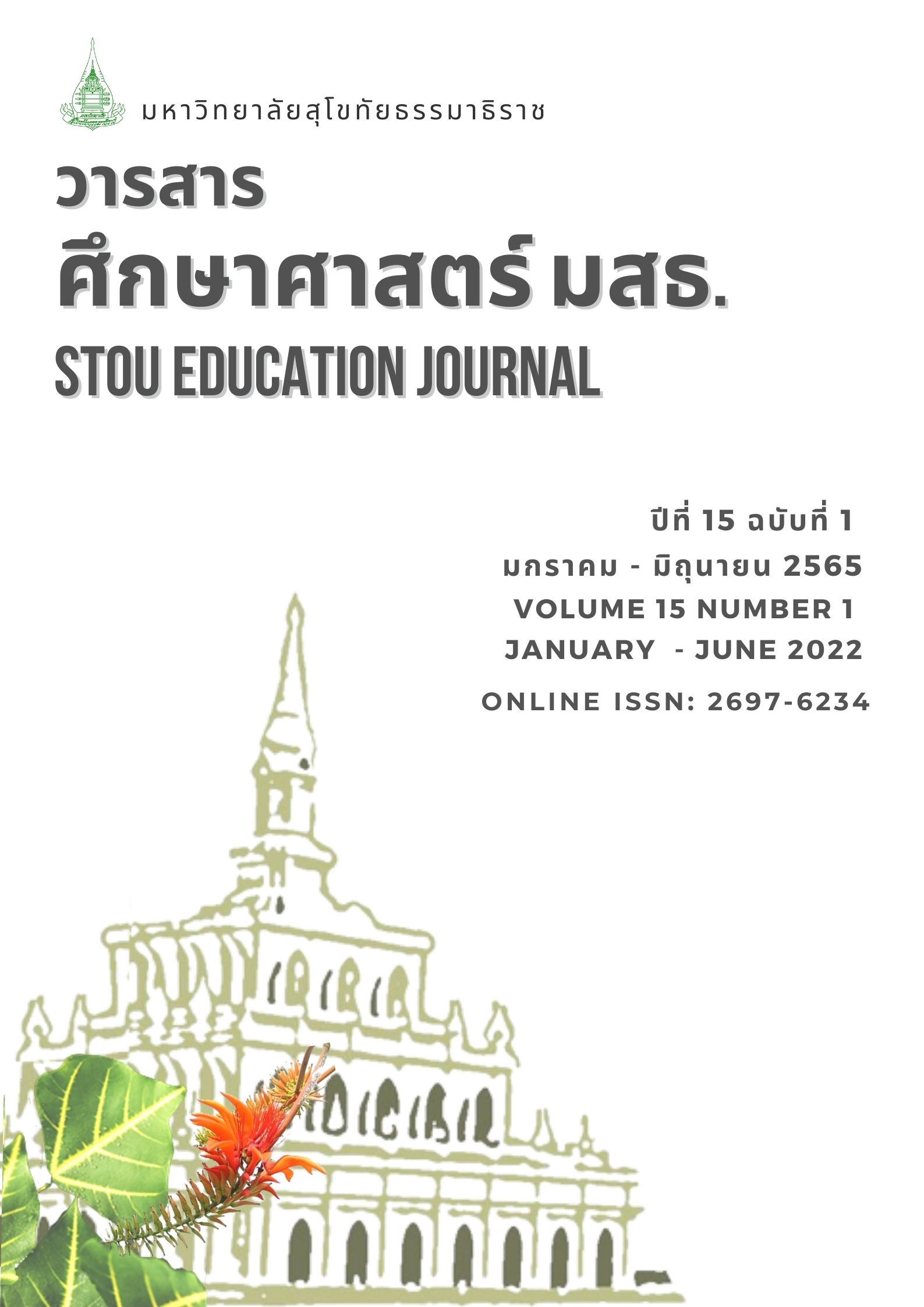เป้าหมายการเรียนวิทยาศาสตร์และวิธีการพัฒนาทักษะเชิงพฤติกรรม ในชั้นเรียนวิทยาศาสตร์: ทัศนะของครูระดับประถมศึกษาตอนปลาย
Main Article Content
บทคัดย่อ
งานวิจัยนี้มีวัตถุประสงค์เพื่อศึกษาเป้าหมายการเรียนวิทยาศาสตร์และวิธีการพัฒนาทักษะเชิงพฤติกรรมในชั้นเรียนวิทยาศาสตร์ตามทัศนะของครูระดับประถมศึกษาตอนปลาย เก็บรวบรวมข้อมูลจากแบบสอบถามการพัฒนาทักษะเชิงพฤติกรรมภายใต้มุมมองของครูผู้สอนวิชาวิทยาศาสตร์ระดับประถมศึกษาตอนปลาย จำนวน 25 คน จาก 25 โรงเรียน ในจังหวัดพระนครศรีอยุธยา กลุ่มตัวอย่างได้มาด้วยวิธีการสุ่มตัวอย่างอย่างง่าย ได้ข้อมูลจากครูทั้งสิ้น 20 คน จาก 20 โรงเรียน คิดเป็นร้อยละ 80 ของแบบสอบถามทั้งหมดที่ส่งไป วิเคราะห์ข้อมูลโดยการหาความถี่ ร้อยละ และ การวิเคราะห์เชิงเนื้อหา ผลการวิเคราะห์ข้อมูลมีข้อค้นพบที่น่าสนใจคือ ครูส่วนใหญ่เชื่อว่าเป้าหมายสำคัญของการเรียนรู้วิทยาศาสตร์คือ การสอนวิทยาศาสตร์ในด้านเนื้อหาความรู้ (ร้อยละ 75) มากกว่าการพัฒนาจิตวิทยาศาสตร์ หรือทักษะเชิงพฤติกรรม ส่วนวิธีการที่ครูใช้พัฒนาทักษะเชิงพฤติกรรมในชั้นเรียนวิทยาศาสตร์ พบว่า ครูมักใช้การเสริมแรงทางบวกหรือทางลบและการทำงานเป็นกลุ่ม และครูวิทยาศาสตร์ร้อยละ 75 มีความต้องการให้มีการพัฒนาวิชาชีพครูเพื่อสอนในเรื่องทักษะเชิงพฤติกรรมในห้องเรียนวิทยาศาสตร์
Article Details
เอกสารอ้างอิง
กรมการปกครองส่วนท้องถิ่น. (2563). แผนการพัฒนาการศึกษาท้องถิ่น (พ.ศ. 2561-2565). กรมการปกครองส่วนท้องถิ่น.
โครงการ PISA ประเทศไทย สถาบันส่งเสริมการสอนวิทยาศาสตร์และเทคโนโลยี. (2561). การแก้ปัญหาแบบร่วมมือ (Collaborative Problem Solving) บทสรุปสำหรับผู้บริหาร. สถาบันส่งเสริมการสอนวิทยาศาสตร์และเทคโนโลยี (สสวท.)
ธีรฎา ไชยเดช, สกนธ์ชัย ชะนูนันท์, และวิภารัตน์ เชื้อชวด ชัยสิทธิ์. (2560). การพัฒนาสมรรถนะการแก้ปัญหาแบบร่วมมือด้วยการจัดการเรียนรู้โดยใช้วิจัยเป็นฐาน ตามแนวคิดสะเต็มศึกษา เรื่อง เชื้อเพลิง ซากดึกดำบรรพ์และผลิตภัณฑ์. วารสารหน่วยวิจัยวิทยาศาสตร์ เทคโนโลยี และสิ่งแวดล้อมเพื่อการเรียนรู้, 8(1), 51-66.
รุ่งฤดี กล้าหาญ, ดวงเดือน ศาสตรภัทร, และ สายสมร เฉลยกิตติ. (2559). การพัฒนารูปแบบการวัดและประเมินพฤติกรรมเพื่อเสริมสร้างคุณลกัษณะ อันพึงประสงค์ของนักเรียนชั้นประถมศึกษาตอนปลายของไทยในศตวรรษที่ 21. วารสารพยาบาลทหารบก, 17(2), 21-33.
พิเชษฐ ยังตรง, พิณสุดา สิริธรังศร, และ สินธะวา คามดิษฐ์. (2560). กลยุทธ์การพัฒนาคุณลักษณะที่พึงประสงค์ของผู้เรียนในสถานศึกษาขั้นพื้นฐานในศตวรรษที่ 21. วารสารสุทธิปริทัศน์, 31(100), 1-12.
พิริยะ ผลพิรุฬ. (2558). ครุเศรษฐศาสตร์ (รายงานผลการวิจัย). สถาบันบัณฑิตพัฒนบริหารศาสตร์.
วศิน โกมุท. (2559). คะแนน O-NET ภาพสะท้อนคุณภาพการศึกษาท้องถิ่น. วารสารศิลปศาสตร์ มหาวิทยาลัยอุบลราชธานี, 12(2), 1-38.
ศมกร ศิลาโชติ, สิรินภา กิจเกื้อกูล, และ วิภารัตน์ เชื้อชวด ชัยสิทธิ์. (2563). การพัฒนาสมรรถนะการแก้ปัญหาแบบร่วมมือของนักเรียนชั้นมัธยมศึกษาปีที่ 5 โดย การจัดการเรียนรู้ตามแนวสะเต็มศึกษาที่เน้นการใช้ปัญหาเป็นฐาน เรื่อง ไฟฟ้าเคมี. วารสารศึกษาศาสตร์ มหาวิทยาลัยนเรศวร, 22(3), 248-261.
Arghode, V., Yalvac, B., & Liew, J. (2013). Teacher empathy and science education: A collective case study. Eurasia Journal of Mathematics, Science & Technology Education, 9(2), 89-99.
Bancong, H., & Song, J. (2020). Exploring how students construct collaborative thought experiments during physics problem-solving Activities. Science & Education, 29(9), 617-645.
Baumeister, R. F., Vohs, K. D., & Tice, D. M. (2007). The strength model of self-control. Current Directions in Psychological Science, 16(6), 351-355.
Costa, P. T. Jr., & McCrae, R. R. (1995). Domains and facets: Hierarchical personality assessment using the revised NEO personality inventory. Journal of Personality Assessment, 64, 21–50.
Duckworth, A. L., & Quinn, P. D. (2009). Development and validation of the short grit scale (grit–s). Journal of Personality Assessment, 91(2), 166–174.
Gabrieli, C., Ansel, D., & Krachman, S. (2015). Ready to be counted: The research case for education policy action on non-cognitive skills. https://goo.gl/7e8Kkg
Gresham, F. M., & Elliott, S. N. (2011). Test review. Journal of Psychoeducational Assessment, 29(3), 292 –296.
Gutman, L. M., & Schoon, I., (2013). The Impact of Non-Cognitive Skills on Outcomes for Young People. Institute of Education University of London.
Heckman, J. J., Stixrud J., & Urzua S. (2006). The effects of cognitive and non-cognitive abilities on labor market outcomes and social behavior. Journal of Labor Economics, 24(3), 411–482.
Hsiao, W.-T., Wu, M.-C., Lee, C.-F., & Chang, W.-L. (2019). An analytic study on constructional relationship of intrapersonal factors fostering innovation competency: From Taiwanese students’ perspectives. Eurasia Journal of Mathematics, Science and Technology Education, 15(12), em1780. https://doi.org/10.29333/ejmste/110486
Rosen, J. A., Glennie, E. J., Dalton, B. W., Lennon, J. M., & Bozick, R. N. (2010). Non-cognitive skills in the classroom: New perspectives on educational research. NC: RTI Press publication.
Ryan, K. (2002). The six E’s of character education. Center for the Advancement of Ethics and Character.
Stoilescu, D., McDougall, D., & Egodawatte, G. (2016). Teachers’ views of the challenges of teaching grade 9 applied mathematics in Toronto schools. Educational Research for Policy and Practice, 15(2), 83–97.
Zhou, K. (2017). Non-cognitive skills: Potential candidates for global measurement. European Journal of Education, 52, 487-497.


